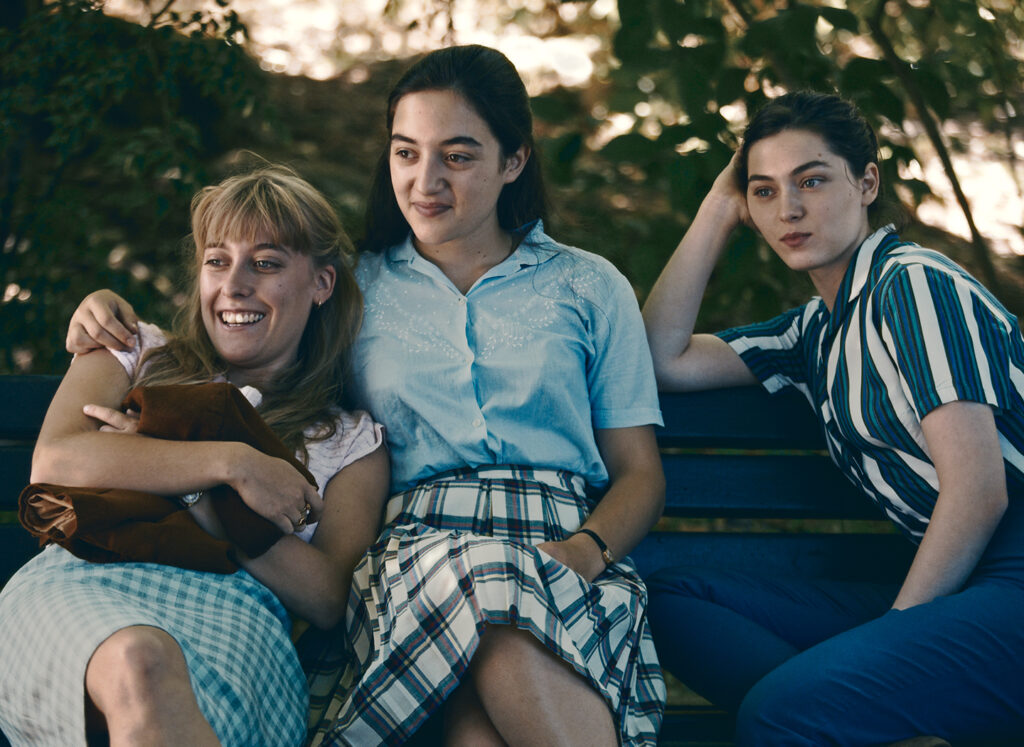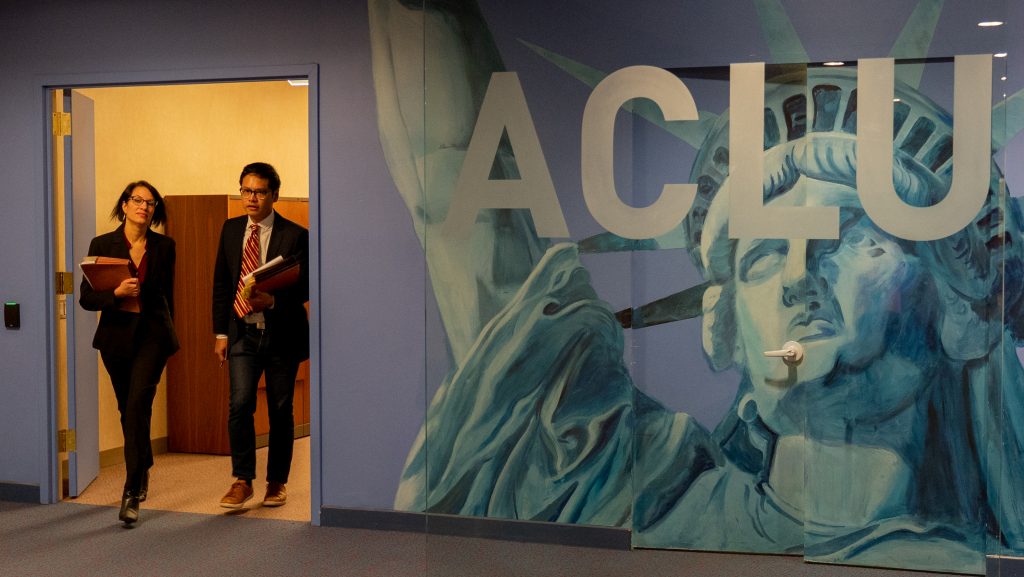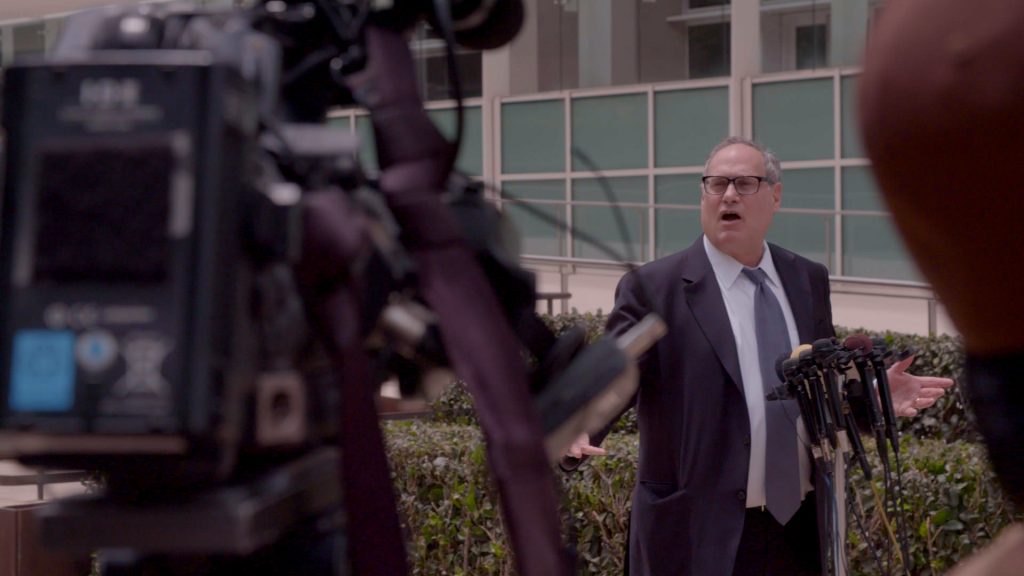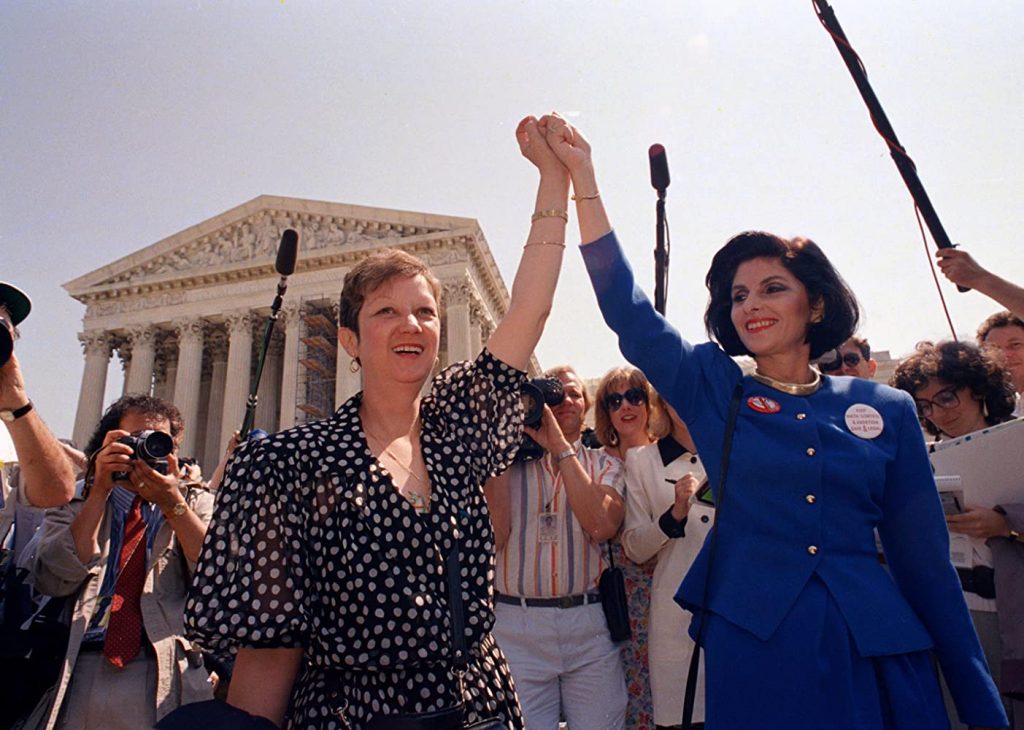June 7, 2022
by Carla Hay
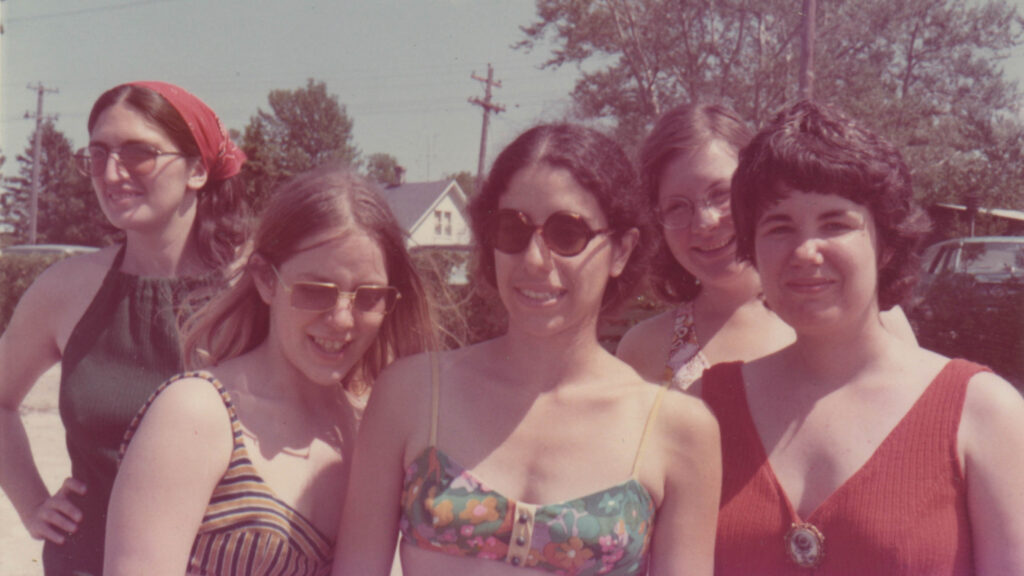
Directed by Tia Lessin and Emma Pildes
Culture Representation: The documentary “The Janes” features a predominantly white group of people (with a few African Americans) discussing the Jane network, a Chicago-based group of mostly women who provided abortion services and counseling before the U.S. Supreme Court case Roe v. Wade made abortion legal on a federal level in 1973.
Culture Clash: The Jane network had to be an underground, outlaw group when abortion was illegal, and some members got arrested for homicide in 1972.
Culture Audience: “The Janes” will appeal primarily to people interested in a fascinating documentary about reproductive rights and people who believe in a woman’s right to choose if or when to have a child.

Regardless of how people feel about abortion, “The Janes” documentary is not only a history lesson about what life in America was like before Roe v. Wade but it’s also a compelling reminder of what’s at stake in reproductive rights and family planning. One of the best things about the movie is that it doesn’t give the narrative over to politicians. Instead, the story is told mostly from the perspectives of people who were involved with the Jane network, the Chicago-based underground group that provided abortion services and counseling at a time when abortion was illegal in Illinois and most other states in America.
The Jane network, whose origins began in 1965, disbanded in 1973, when the U.S. Supereme Court case Roe v. Wade made abortion legal on a federal level. The Jane network got its name because people who needed the services were told to ask for someone with the code name Jane when contacting the network, which advertised through flyers and through word of mouth. The outreach began on college campuses but then extended to many other communities in the Chicago area, including low-income and underprivileged communities.
Directed by Tia Lessin and Emma Pildes, “The Janes” had its world premiere at the 2022 Sundance Film Festival. The documentary begins with a harrowing personal story told by Dorie Barron, who got two abortions when abortion was illegal. She got the first abortion at a place that turned out to be disreputable: “I just wanted it over with,” Barron says of the abortion. “I had no other options. I was that desperate.”
Barron also remembers that because of the outlaw nature of this procedure: “It was [like] the mob. You had to talk in code.” “Chevy” meant the abortion cost $500. “Cadillac” meant that the abortion cost $750. “Rolls Royce” mean that the abortion cost $1,000.
Barron vividly recalls that as she was waiting to get her abortion that there were “three men and one woman, who brought another patient. They spoke all of three sentences the entire time: ‘Where’s the money? Lie back and do as I tell you. Get in the bathroom.'”
This cold and uncaring attitude wasn’t the worst of her experience though. After the abortion, she and the other abortion patient were sent to a hotel room. Barron says she was bleeding profusely and decided to get professional medical help for herself, knowing she’d be at risk of being arrested if the medical professional who treated her wanted to report her for having an abortion. “If I had stayed in that hotel room, I’d be dead,” Barron says emphatically.
Barron says she had her second abortion with the Jane network, which she describes as giving her a “total opposite” experience compared to her first abortion. With the Jane network, Barron says: “All I heard were kind words, consideration, concern. When I tell you they changed my life, they changed my life.”
Barron’s story is an example of how the Jane network distinguished itself from the incompetent patient care that other underground abortionists provided. According to “The Janes,” the Jane network is estimated to have performed about 11,000 abortions, with none of the patients dying as a direct result of these abortion procedures. It’s an astounding feat, considering all the horror stories before Roe v. Wade of women and girls who died after getting illegal abortions.
The documentary includes disturbing details of septic wards in Chicago hospitals where women and girls with botched abortions often received improper treatment and sometimes died as a result. Those who didn’t die were at risk of being arrested. Several people in the documentary say that the Jane network was different from other abortion groups because the Jane network was led by women, and the services included empathetic counseling in a safe and non-judgmental atmosphere.
The Jane network’s origins began in 1965, when activist Heather Booth was a student at the University of Chicago. A friend, who was also a University of Chicago student, was raped, and the rape victim was unfairly shamed for being “promiscuous.” In 1965, Booth also became involved in the Freedom Summer Project, an activist event. “And during that summer, I learned you have to stand up to legitimate authority,” Booth says in the documentary. “Sometimes, there are unjust laws that need to be challenged.”
Booth states that the turning point for her to become a reproductive rights activist was when a friend told her that his pregnant sister was suicidal because the pregnancy was unwanted. It motivated Booth to start an underground abortion service that ended up growing into the Jane network, whose official name was Abortion Counseling Service of the Chicago Women’s Liberation Union. Booth says in the documentary that when she launched this service, she was referred to Dr. T.M. Howard, a medical professional who could perform abortions. When she started getting more people to refer to Dr. Howard, she knew there was a demand to have an underground network.
“The Janes” documentary has interviews with several other women who worked in the Jane network, including Judith Arcana (also known as Judy Pildes), Marie Leaner, Martha Scott, Diane Stevens, Eleanor Oliver and Laura Kaplan. The documentary also features interviews with women who used the Jane network’s abortion services (or took a friend to the Jane network) but who only wanted to be identified by a first name in this movie. They include women identified by the names Abby, Eileen, Crystal O., Jeanne, Peaches and Sheila.
After Dr. Howard was arrested for performing illegal abortions, Booth was referred to someone who is interviewed in the documentary and uses the alias Mike. When Mike worked with the Janes, he used the code name Dr. Kaplan, even though he was never a medical doctor, but he received abortion training from a real medical doctor. The Jane network found out that Mike wasn’t a real doctor, but continued to use his services out of necessity until they parted ways with him because of money issues.
Mike says he got involved in doing Jane network abortions because it paid about “four or five times” the amount of money that he could make from doing construction work. He says he didn’t get personally involved with any of the patients’ feelings or problems when doing abortions. “It was a job,” he says nonchalantly in the documentary. By his own admission, Mike eventually had a falling out with the Jane network when he wanted to get paid more money than the network could give him.
Leaner comments on Mike: “I thought he was a blowhard, sort of a con man and a showman and a wise guy. But I also thought that he had a heart.” Mike wasn’t the only person doing abortions for the Jane network. Many women of the Jane network eventually performed abortions, even though they were not medical doctors either. It’s mentioned in the documentary that they did so because licensed medical doctors did not want to get involved or would charge too much money.
Because of the secretive nature of the Jane network, it was standard practice to talk in code. “The Front” was the term used for the waiting room. “The Place” would be the place where the abortions procedures happened. Women and girls who needed the abortion services could use aliases, although they often had to provide the real phone numbers where they could be contacted. In an era before the Internet or burner cell phones, it was a lot harder for people to get temporary contact information that couldn’t be traced back to them.
However, the Jane network had a confidentiality policy not just for their clients’ protection but also for their own protection. It’s mentioned in the documentary that the Chicago Mafia got involved (no doubt through payoffs for protection), which is typical of any illegal operation that attracts the Mafia. At a time when the overwhelming majority of attorneys, doctors and clergy were men, the Jane network also had male allies in these professions who would secretly offer their services to Jane clients.
Speaking of attorneys, Arcana’s lawyer husband (who has a surname that is not Arcana) is also interviewed in “The Janes.” At his request, he is only identified in the documentary by his first name: Michael. He says that he and many of his mostly male attorney peers did not want to get involved in abortion issues at the time, not only because abortion was illegal then but also because civil rights attorneys such as himself were more focused on race relations and had little to no interest in women’s rights.
Still, Arcana says that being a white woman married to an attorney helped a great deal when she and six other Jane network members were arrested in Chicago for homicide on May 3, 1972, because of the abortion services that they provided. The arrestees were Arcana, Scott, Stevens, Jeanne Galatzer-Levy, Abby Pariser, Sheila Smith and Madeleine Schwenk. (Ironically, nearly 50 years to the day later—on May 2, 2022—the news website Politico revealed a U.S. Supreme Court leaked draft suggesting that members of the court are preparing to overturn Roe v. Wade.)*
Arcana, who had recently given birth at the time of her 1972 arrest, says in the documentary that she had certain privileges that she knew would work to her advantage when it came to getting out on bail. Arcana comments, “Not only was I a nursing mother, I was a college graduate, a white woman, and married to a lawyer. And all of those things were going to get me out on bail. And boy, did I not disbelieve that.”
Because most of the Janes were privileged white women (many were homemakers, college students and full-time activists), they often came from very different backgrounds from many of the low-income people who needed the Jane network’s services. When New York state made abortion legal in 1970, and certain women in the Chicago area could afford to travel to New York for abortions, the Jane clients’ demographics changed to have more low-income people than ever before. “The Janes” documentary mentions that there were tensions and disagreements in the group about how to interact with underprivileged people. The Jane network eventually agreed to offer discounts or free services to those who couldn’t afford to pay the full price.
Issues of race and social class also came up because women of color were rarely allowed to be Jane network leaders. Leaner (who is African American) comments, “There were more women of color—not necessarily on the team of people, but the people who consumed the service.” Kaplan agrees: “The women who came through the Jane network [for abortion services] were very, very different from the women who were in Jane. We would say to women [of color], ‘You can join us,’ but there weren’t a lot of takers.”
“It was a concern for us,” Kaplan says of the differences in racial and social classes between the most of the Jane network workers and most of the Jane network clients, particularly in the network’s later years. “We were primarily white, middle-class women.” The documentary mentions that efforts were made to be mindful of different races and social classes, but the Jane network wasn’t perfect, and it how to deal with race/class differences was an area that always needed improving.
“The Janes” documentary says that Leaner was instrumental in getting civil rights attorney Jo-Anne Wolfson to represent the Jane network defendants in the homicide case. Wolfson, who was initially reluctant to take the case, had a strategy to delay the trial as much as possible. It turned out to be the correct strategy because the U.S. Supreme court’s Roe v. Wade decision in 1973 made the homicide charges no longer legally viable, so the charges were dropped. The Jane network disbanded not long after the Roe v. Wade decision, since their underground services were no longer needed.
The documentary doesn’t sugarcoat that abortion before Roe v. Wade was risky not just for physical reasons and legal reasons, but also for psychological and emotional reasons. The stress of being involved in illegal abortions took a toll on many of the clients and workers of the Jane network. The documentary mentions that one Jane leader identified only as Jody eventually had to check into a psychiatric facility because she had a breakdown. Jody eventually quit the Jane network.
And how did the Jane network stay underground for as long as it did with no arrests until 1972? Arcana’s husband Michael puts it bluntly by saying that a lot of the Jane network’s abortion clients were the wives, girlfriends and daughters of influential people in law enforcement and politics. Many of these men paid for the abortions.
Other people interviewed in the documentary include former Chicago homicide detective Ted O’Connor, Rev. Patricia Novick-Raby and Rev. Dr. Donna Schaper. In the documentary, Dr. Allan Weiland and former registered nurse Kathleen Kennedy talk about what they witnessed in pre-Roe. v. Wade septic wards at Chicago hospitals. A man who is only identified by the name Wayne says in the documentary that he was married to a woman who worked in the Jane network with his full support. “Our daughters understood not to talk about it, but they understood that it was just part of my life,” Wayne comments.
As a documentary, “The Janes” might not change people’s minds about the abortion issue. But the movie certainly succeeds in showing that abortion is a health issue that can affect anyone. This isn’t an issue that should be considered only in the realm of a select number of elite politicians and other lawmakers. “The Janes” shows in no uncertain terms that people who are directly affected can be family members, friends and other loved ones of people from all walks of life. These human stories and experiences are at the heart of reproductive rights and family planning.
*UPDATE: On June 24, 2022, the U.S. Supreme Court overturned Roe v. Wade, thereby eliminating the federal law making abortion legal in the U.S., and giving jurisdiction to each U.S. state to decide what the state’s abortion laws will be. This ruling means that abortions in the U.S. can now be illegal or legal, depending on the state.
HBO and HBO Max will premiere “The Janes” on June 8, 2022.


